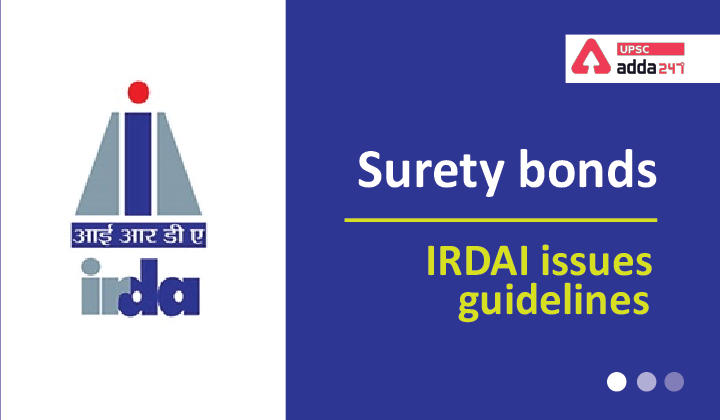Table of Contents
Surety bonds: Relevance
- GS 3: Indian Economy and issues relating to planning, mobilization, of resources, growth, development and employment.
Surety bonds: Context
- Recently, Insurance Regulatory and Development Authority of India (IRDAI) has unveiled the guidelines to facilitate the launch of various types of surety bonds in the country.
Surety bonds: Key points
- The guideline has come in the backdrop of a request made by the Ministry of Road Transport and Highways last year to examine the possibility of offering surety bonds by general insurance companies.
- After a proposal from the Ministry of Road Transport and Highways, IRDAI has formed a panel under G Srinivasan to assess the suitability of the Indian insurance industry or any other sector to offer Surety Bonds for road contracts.
- IRDAI has said that insurance companies can launch the surety bonds now, assuring payments in the event of default, thus giving a big push to infrastructure projects in the country.
What are surety bonds?
- Surety bond can be said as a promise to be liable for the debt, default, or failure of someone else.
- It is a three-party contract in which one party (the surety) guarantees the performance or obligations of a second party (the principal) to a third party (the obligee).
How surety bonds will work?
- A surety bond is provided by the insurance company on behalf of the contractor to the entity, which is awarding the project.
- When a principal breaks a bond’s terms, the harmed party can make a claim on the bond to recover losses.
- It can effectively replace the system of bank guarantee, issued by banks for projects, and help reduce risks due to cost overrun, project delays and poor contract performance.
Types of surety bonds
There are two broad categories of surety bonds:
- Contract surety bonds; and
- Commercial (also called miscellaneous) surety bonds.
Contract surety bonds
- Contract surety bonds are those surety bonds that are written for construction projects.
How it works?
- A project owner (the obligee) seeks a contractor (the principal) to fulfil a contract.
- The contractor, through a surety bond producer, obtains a surety bond from a surety company.
- If the contractor defaults, the surety company is obligated to find another contractor to complete the contract or compensate the project owner for the financial loss incurred.
Types of Contract Surety bonds
There are four types of contract surety bonds
- Bid Bond: It provides financial protection to the owner if a bidder is awarded a contract but fails to sign the contract or provide the required performance and payment bonds.
- Performance Bond: It provides an owner with a guarantee that, in the event of a contractor’s default, the surety will complete or cause to be completed the contract.
- Payment Bond: It ensures that certain subcontractors and suppliers will be paid for labor and materials incorporated into a construction contract.
- Warranty Bond (also called a Maintenance Bond): It guarantees the owner that any workmanship and material defects found in the original construction will be repaired during the warranty period.
Surety bonds: Key guidelines
- According to the guidelines, the premium charged for all surety insurance policies underwritten in a financial year, should not exceed 10 per cent of the total gross written premium of that year, subject to a maximum of Rs 500 crore.
- As per IRDAI, insurers can issue contract bonds, which provide assurance to the public entity, developers, subcontractors and suppliers that the contractor will fulfil its contractual obligation when undertaking the project.
- The limit of guarantee should not exceed 30 per cent of the contract value. Surety Insurance contracts should be issued only to specific projects and not clubbed for multiple projects.
- The current insurance legal/ regulatory framework does not permit underwriting of bonds that guarantee performance and bid securities as they are financial instruments and not conventional insurance products.
Also Read:





 TSPSC Group 1 Question Paper 2024, Downl...
TSPSC Group 1 Question Paper 2024, Downl...
 TSPSC Group 1 Answer key 2024 Out, Downl...
TSPSC Group 1 Answer key 2024 Out, Downl...
 UPSC Prelims 2024 Question Paper, Downlo...
UPSC Prelims 2024 Question Paper, Downlo...




